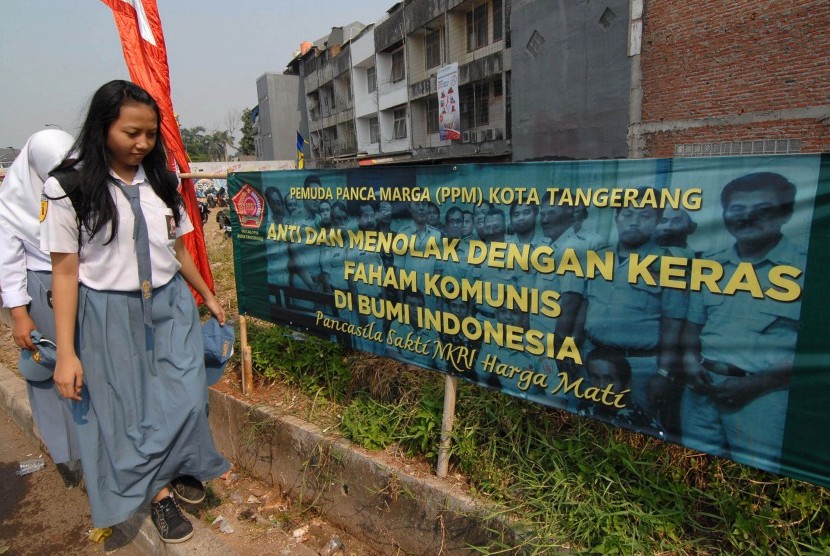By : Kurniadi *)
REPUBLIKA.CO.ID - Rights activists have slammed the government's draft amendment of the Criminal Code (KUHP), which still retains articles banning communism in the country, saying that the regulation is irrelevant in the present day.
The National Commission of Human Rights (Komnas HAM) commissioner Roichatul Aswidah said Article 219 of the Criminal Code, which stipulates that anyone who goes against the law by advocating communism can be sentenced to a maximum seven years' imprisonment, could be misused especially since the details were vague in explaining what actions constituted going "against the law".
Despite adding the provision to protect academic study and analysis of Marxist-Leninist thought, other articles covering the ban on communism, including Article 220 and 221, were open to multiple interpretations, adding that the impact would likely result in more human rights violation rather than protecting the country.
Meanwhile, Institute for Criminal Justice Reform (ICJR) executive director Supriyadi Widodo Eddyono said the articles did not conform with the legal principles of a democratic system, especially since the ambiguous content deviated from lex scripta principles which is applicable in the Indonesian legal system.
Earlier, members of the International People's Tribunal on the 1965 crimes against humanity in Indonesia (IPT 1965) are resolved to pursue justice over the genocide of the 1965 anticommunist purge and will submit the tribunal’s hearing results that were published to the Indonesian government, the IPT coordinator has said.
"The verdict will be conveyed to the Attorney General’s Office [AGO], Coordinating Political, Legal and Security Affairs Minister, Law and Human Rights Minister and the Foreign Ministry's human rights department, as well as to the Office of the Presidential Staff and President Joko "Jokowi" Widodo in a meeting, which was previously promised by former presidential spokesman Johan Budi,” IPT 1965 coordinator Nursyahbani Katjasungkana said on Wednesday during a presentation of the final report from the tribunal.
Conclusions from the hearing, which was held last year in The Hague from Nov. 10 to 13, have listed a set of recommendations to the Indonesian government in addressing past crimes against humanity that took place throughout the anti-communist purge in 1965, which had allegedly killed approximately 500,000 people. The document calls on the government to formally apologize to the victims and their families, provide compensation to them and to investigate and charge the perpetrators of the crimes.
On April 17 next year, Nursyahbani said, the report on the implementation of human rights in Indonesia would be reviewed in the Universal Periodic Review at the Human Rights Council in Geneva. "This also will be an opportunity for us to submit the IPT 1965 verdict as a non-governmental report from Indonesia," Nursyahbani said.
Still Alive
In the era of reformation and democratization since the new era regime was stepped down, its would be chance for a communism supporters or a communism symphatizers to purge their tenet which had a special purpose to make a communism ideology could be spreaded more huge in Indonesian society.
However, its must be realized that a communism threats is still alive in Indonesia. According to threats theory was described that threat is intention, capability and circuumstances, its was described very clear right now. A communist group or a communist supporters have a deep intention to purge their tenet. These efforts has been supported by a number of human rights activist, NGO figure, academia and another circle.
Their intention can be seen such as a number of communist symphatizers have decried and slammed on the government's draft amendment of the Criminal Code (KUHP), which still retains articles banning communism in the country. Another indicators like members of the International People's Tribunal on the 1965 crimes against humanity in Indonesia (IPT 1965) to pursue justice over the genocide of the 1965 anticommunist purge and will submit the tribunal’s hearing results.
Indeed, we have a circumstace which make a communist ideology could be still alived in Indonesia such as unemployment, poverty, dullness, a wrong way of life such as hedonism, indifference, intolerance etc. Those strategic problems could be politized by a communist group as the failure of state or Pancasila as our national tenet. Moreover, if we were realized that a communist threats would still alive in our country, so that we vigilance on those ones and we must protect our youth generation from a communist symphatizers infiltration.
*) The author is the alumni of Padjajaran University (Unpad), former Director of Mass Communication in Lembaga Analisa Politik dan Demokrasi, Jakarta


